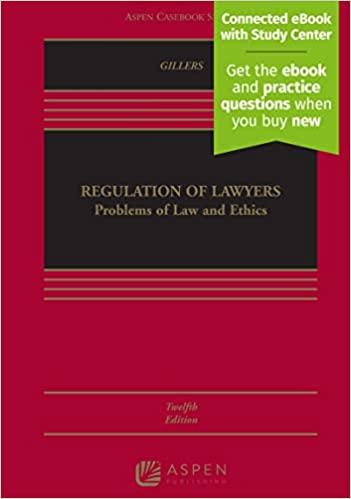Question
12. The honors program of the state's flagship university appealed to the state, claiming that the large size of the program was starting to hurt
12. The honors program of the state's flagship university appealed to the state, claiming that the large size of the program was starting to hurt its effectiveness. In response, the state passed a new law limiting enrollment in the program to only students who are in the top 5 percent of their high school class or who score in the top 5 percent of the SAT or ACT. Importantly, admissions officers are no longer able to take any other factors into account, such as race, gender, economic disadvantage, or sports and club membership. A group of concerned citizens sues, arguing the honors college will not have as diverse of a student body because race will no longer be taken into account in determining enrollment. Is the new law constitutional?
(A) Yes, because courts will defer to institutional judgment in matters of education.
(B) Yes, because it does not mention race or target racial minorities.
(C) No, because the law has a discriminatory effect.
(D) No, because the state has not shown the law is necessary to achieve a compelling state interest.
13. The state requires persons applying for state welfare assistance, driver's licenses, admission to the state university, or certain other state benefits to list their federal social security numbers as part of their applications. In this connection, state agencies refer to an applicant's social security number as his or her ''Central File Number.'' The plaintiff has brought an action in a federal court against certain specified state officials for an order enjoining them from using social security numbers in this fashion. In support of his position, the plaintiff argues that at some time almost all citizens of the state apply for some form of state benefit, and that the compilation of a central file on each citizen of the state is likely to have a chilling effect on the exercise of rights granted by the First Amendment to the United States Constitution.
What is the clearest reason for the dismissal of the plaintiff'ssuit?
(A) The action is unripe.
(B) The question presented ismoot.
(C) Under the Eleventh Amendment to the United States Constitution, state officials are immune to lawsuits of thiskind.
(D) The creation of a central file on each person applying for state benefits involves the resolution of political questions.
14. In which of the following fact situations has there most clearly been a violation of the plaintiff's rights under the Fourteenth Amendment to the United States Constitution?
(A) Plaintiff is a black person whose application for state employment was rejected because he failed to pass the state Civil Service examination. Statistics reveal that 10 percent of the black applicants and 60 percent of the white applicants who have taken the exam have passedit.
(B) Plaintiff is an American of Mexican descent who was denied admission to a privately-owned hospital solely because of her ethnic background, but who received competent professional treatment at a state hospital instead.
(C) Plaintiff is a Jewish person who resided in a federally operated housing project, and who was excluded from a prayer breakfast held by the federal agency that ran the project solely because of his religion.
(D) Plaintiff is a woman whose application for employment as a deputy sheriff was rejected by the county solely because of hersex.
15. A state statute known as the Unlawful Assembly Law contains the following provision:
Section IIt shall be a misdemeanor for any group of three or more persons to gather on a public sidewalk and to deliberately conduct themselves in a manner that is offensive to passersby.
When the governor of the state refused to grant a pardon to a college student who had been convicted of destroying state college property during a campus protest, members of a student organization decided to disrupt state government operations by conducting a loud and boisterous demonstration outside a state government office building that they selected at random. About 30 members gathered on the sidewalk outside the building with noisemakers and musical instruments and began marching while making a loud and disturbing noise. Several persons who had business inside the building were unable to get past the crowd of demonstrators to enter. The defendant, one of the participants, was arrested for marching and shouting obscene words that many passersby found offensive.
The defendant is prosecuted for violating Section I of the Unlawful Assembly Law. He defends by asserting that the section is overbroad. How should the courtrule?
(A) Guilty, because his conduct was in fact offensive to passersby.
(B) Guilty, because the reasonable passerby would have been offended by the defendant's conduct.
(C) Not guilty, because a reasonable person in the defendant's position would not have known that his or her conduct would be offensive to passersby
Step by Step Solution
There are 3 Steps involved in it
Step: 1

Get Instant Access to Expert-Tailored Solutions
See step-by-step solutions with expert insights and AI powered tools for academic success
Step: 2

Step: 3

Ace Your Homework with AI
Get the answers you need in no time with our AI-driven, step-by-step assistance
Get Started


